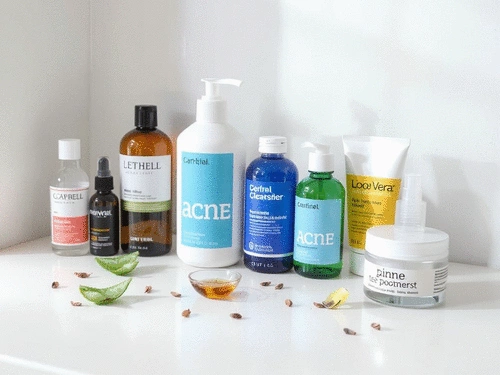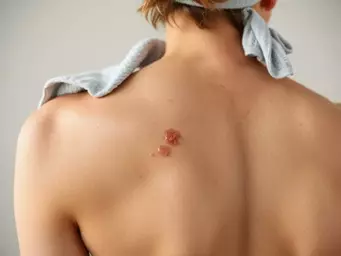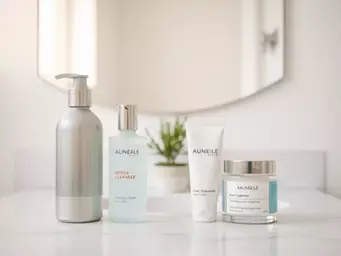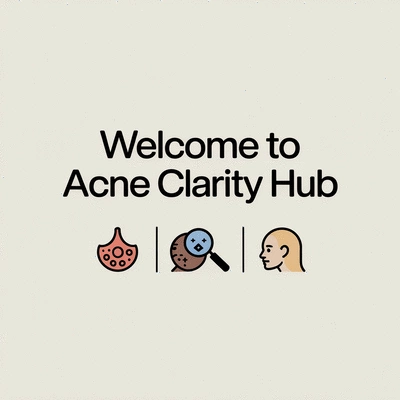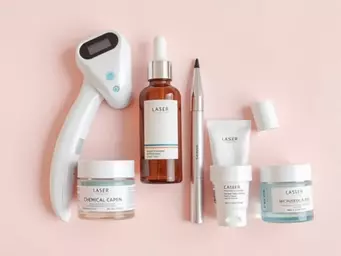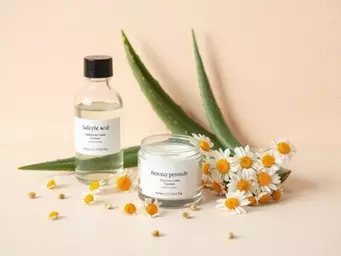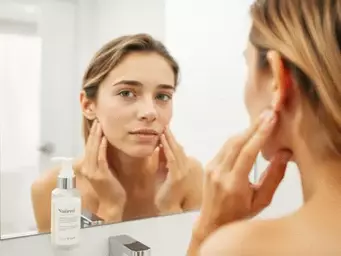Have you ever felt lost in the sea of skincare products, unsure which to trust for your acne? You're not alone! With over-the-counter (OTC) acne treatments becoming increasingly popular, understanding their potential can empower you in your skincare journey.
What You Will Learn
- OTC acne products offer an accessible solution for managing acne without a prescription.
- Key ingredients like benzoyl peroxide and salicylic acid are proven to combat acne effectively.
- Integrating OTC treatments into your skincare routine requires patience and consistency for best results.
- Understanding your skin type is crucial for selecting the right product for your acne needs.
Key Ingredients in OTC Acne Products: A Comparative Overview
Understanding the active ingredients in over-the-counter acne products is crucial for effective treatment. This comparison highlights their mechanisms, suitable skin types, and potential side effects.
Benzoyl Peroxide
Mechanism: Kills acne-causing bacteria, unclogs pores.
Side Effects: Dryness, irritation (start with lower concentration).
Skin Compatibility: Effective for many, but can be harsh.
Salicylic Acid
Mechanism: Exfoliates, promotes cell turnover, clears pores, anti-inflammatory.
Side Effects: Generally well-tolerated, mild dryness possible.
Skin Compatibility: Suitable for oily, acne-prone skin.
Adapalene
Mechanism: Topical retinoid, prevents clogged pores, promotes cell turnover.
Side Effects: Less irritating than other retinoids, some dryness initially.
Skin Compatibility: Good for many, especially sensitive skin.
Niacinamide
Mechanism: Reduces inflammation, manages hyperpigmentation, improves skin barrier.
Side Effects: Generally mild, well-tolerated.
Skin Compatibility: Excellent for acne-prone skin, also addresses post-acne concerns.
Understanding Over-the-Counter Acne Products
Over-the-counter (OTC) acne products are skincare solutions available without a prescription, making them accessible to anyone looking to manage their acne. These products come in a variety of forms, including cleansers, creams, gels, and spot treatments. With such a wide range of options, it can be overwhelming to choose the right product for your skin!
Common OTC acne treatments typically contain active ingredients that target the root causes of acne, like excess oil and bacteria. This makes them a popular choice among those struggling with acne vulgaris, as they can be integrated into daily skincare routines without needing a visit to the dermatologist.
What Are Over-the-Counter Acne Treatments?
OTC acne treatments are formulations designed to help combat acne without requiring a doctor's approval. They are readily available at pharmacies, supermarkets, and online retailers. Many of these products are tailored to suit different skin types and levels of acne severity, providing options for everyone!
- Cleansers: Remove dirt and excess oil from the skin.
- Topical treatments: Applied directly to blemishes to reduce inflammation.
- Moisturizers: Help maintain skin hydration while combating acne.
- Spot treatments: Target individual pimples for quick relief.
Understanding the different forms of OTC products is essential for effective acne management. By finding the right fit for your skin type, you can streamline your skincare routine and enhance your chances of achieving clearer skin!
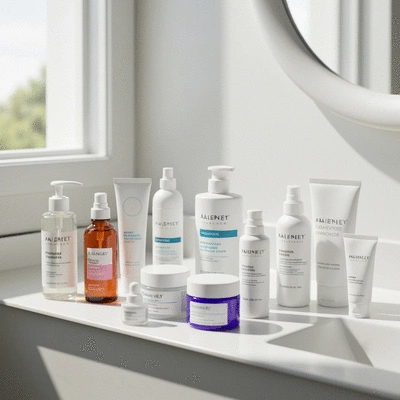
The Role of OTC Products in Acne Management
OTC acne treatments play a significant role in the daily skincare routines of many individuals. They allow for effective management of acne without the need for prescription medications, which can be costly and time-consuming. Regular use of these products can lead to improved skin texture and a reduction in breakouts over time.
Moreover, OTC treatments are often formulated with ingredients backed by research, ensuring their efficacy. This accessibility empowers individuals to take control of their skincare journeys. At Acne Clarity Hub, we emphasize the importance of informed choices when selecting these treatments to support your journey toward clearer skin.
Key Ingredients in OTC Acne Products
Benzoyl Peroxide: Effectiveness and Potential Side Effects
Benzoyl peroxide is one of the most commonly used ingredients in OTC acne treatments. It works by eliminating acne-causing bacteria and helping to unclog pores, making it highly effective for many users. However, while it can provide noticeable results, some may experience side effects like dryness or irritation if used excessively.
To mitigate these effects, I recommend starting with a lower concentration and gradually increasing usage as your skin acclimates. This approach allows you to benefit from benzoyl peroxide while minimizing irritation.
Salicylic Acid: Mechanism and Skin Compatibility
Salicylic acid is another powerhouse ingredient often found in OTC acne products. It works by exfoliating the skin gently and promoting cell turnover, which helps keep pores clear of debris. Salicylic acid is particularly suitable for oily and acne-prone skin types, making it a versatile option for many individuals.
- Exfoliates: Removes dead skin cells to prevent clogged pores.
- Anti-inflammatory: Reduces redness and swelling associated with acne.
- Penetrates pores: Targets blemishes deep within the skin.
As a dermatologist, I've seen countless patients benefit from incorporating salicylic acid into their routines. It's a reliable option that balances effectiveness with skin compatibility!
Adapalene: A Retinoid for Acne Treatment
Adapalene is a topical retinoid that is increasingly popular in OTC products for acne treatment. It aids in preventing clogged pores and promotes cell turnover, making it an excellent choice for many suffering from acne. Compared to other ingredients, adapalene offers the added benefit of being less irritating, which can be a game-changer for sensitive skin.
When considering adapalene, remember that consistency is key! Regular application, as guided by product instructions, will yield the best results over time.
Exploring Niacinamide: Benefits for Acne-Prone Skin
Niacinamide, a form of vitamin B3, has gained attention for its multiple benefits for acne-prone skin. It not only helps reduce inflammation but also assists in managing hyperpigmentation that can result from acne scars. This makes niacinamide an excellent addition to your skincare regimen if you're looking to achieve a more even skin tone.
- Reduces redness: Soothes irritated skin and calms acne flare-ups.
- Improves skin barrier: Supports the skin's natural barrier, enhancing overall health.
- Minimizes pores: Helps in reducing the appearance of enlarged pores.
By incorporating niacinamide into your routine, you can tackle not only acne but also the residual effects it can leave behind. At Acne Clarity Hub, we advocate for a holistic approach to skincare that embraces all aspects of skin health!
Pro Tip
When selecting an over-the-counter acne product, always consider your skin type and any specific concerns you may have. For instance, if you have sensitive skin, look for formulations with lower concentrations of active ingredients or those that include soothing components like niacinamide. This approach can enhance the effectiveness of your treatment while minimizing potential irritation!
Long-Term Management Strategies for Acne
Managing acne can feel like a marathon rather than a sprint. At Acne Clarity Hub, I believe incorporating over-the-counter (OTC) products into your daily routine is essential for long-term success. Here are some practical tips to seamlessly integrate these treatments into your existing skincare regimen:
- Start Slow: Introduce one new product at a time to monitor how your skin reacts.
- Follow Directions: Always adhere to product instructions for the best results.
- Consistency is Key: Use your chosen treatments consistently for several weeks to see changes.
- Layering Products: Apply lighter products first (like serums) before heavier ones (like moisturizers).
By gradually building your skincare routine with these OTC products, you set yourself up for greater success in managing acne. Remember, patience is vital as your skin adjusts!
Preventative Measures: Beyond OTC Treatments
While OTC products play a significant role in acne management, several lifestyle and environmental factors also influence your skin's health. Here are some preventative measures to consider:
- Healthy Diet: Incorporate plenty of fruits, vegetables, and hydration to support your skin’s needs.
- Stress Management: Practice relaxation techniques like meditation or yoga to help keep stress levels in check.
- Skincare Routine: Maintain a gentle skincare routine that doesn’t strip your skin of its natural oils.
- Sun Protection: Use sunscreen daily to protect against UV damage and prevent post-inflammatory hyperpigmentation.
These lifestyle adjustments can significantly enhance the efficacy of your acne treatments. Remember, your skin thrives on a holistic approach!
Emerging Ingredients and Innovations in OTC Acne Care
Exploring New OTC Ingredients: What’s on the Horizon?
As a board-certified dermatologist, I’m always excited about innovative ingredients making their way into OTC acne treatments. Here are a few promising ingredients to watch for:
- Bakuchiol: A plant-based alternative to retinol that may help reduce acne and improve skin texture.
- Polyhydroxy Acids (PHAs): These gentle exfoliants can enhance skin turnover without causing irritation.
- Probiotics: Emerging research, such as that published by the National Institutes of Health, suggests that probiotics may help balance the skin microbiome, potentially reducing acne.
These cutting-edge ingredients show potential in enhancing the effectiveness of OTC acne treatments. Keeping an eye on new research can help you find the best options for your skincare journey!

Comparative Reviews of Popular OTC Acne Brands
When selecting OTC acne products, it’s crucial to consider both effectiveness and value. Here’s a quick overview of popular brands to help you make informed choices:
| Brand | Key Ingredients | Price Range | Availability |
|---|---|---|---|
| Neutrogena | Benzoyl Peroxide, Salicylic Acid | $10 - $30 | Drugstores, Online |
| La Roche-Posay | Salicylic Acid, Niacinamide | $15 - $40 | Pharmacies, Online |
| Proactiv | Benzoyl Peroxide, Adapalene | $20 - $60 | Online, Subscription |
Evaluating brands based on key ingredients and price can help you choose the right products for your skin type. Don't forget to consider what works best for you!
DIY Acne Treatments: Do They Work?
Many people wonder about the effectiveness of DIY acne treatments. While some natural ingredients have benefits, they can also lead to unexpected reactions. Here are a few common DIY treatments and their effectiveness:
- Tea Tree Oil: Known for its antibacterial properties, it can help reduce inflammation but may cause irritation if used undiluted.
- Honey: A natural humectant with anti-inflammatory properties, it can soothe the skin but might not target acne deeply.
- Apple Cider Vinegar: Often touted for its toning effects, it can be harsh on sensitive skin and should be diluted.
Always exercise caution and do a patch test when trying DIY treatments. Sometimes, it’s best to stick to scientifically-backed OTC products for reliable results!
Making Informed Choices for Healthy Skin
Evaluating Efficacy: What to Look For
When it comes to choosing the right product, understanding how to assess efficacy is crucial. Here’s a guide on what to look for:
- Active Ingredients: Check for proven ingredients like benzoyl peroxide or salicylic acid. Research on their efficacy, like that found in articles on the National Institutes of Health PubMed Central, can be very insightful.
- Concentration Levels: Higher concentrations might be more effective, but sensitivity varies by person.
- User Reviews: Look for feedback from others with similar skin types to gauge real-life effectiveness.
- Brand Reputation: Trustworthy brands often have a history of positive results and customer support.
By evaluating these aspects, you can make more informed decisions that align with your skin's needs. Staying informed is key to achieving healthy skin!
Frequently Asked Questions (FAQs) About OTC Acne Treatments
- Q: What are the primary active ingredients in most OTC acne treatments?
- A: The most common active ingredients are benzoyl peroxide, salicylic acid, and adapalene. Niacinamide is also gaining popularity for its anti-inflammatory benefits.
- Q: How long does it take to see results from OTC acne products?
- A: While individual results vary, consistency is key. Most people start to see noticeable improvements within 4-6 weeks of consistent use. Full results may take 2-3 months.
- Q: Can I use multiple OTC acne products at once?
- A: It's generally advisable to introduce one new product at a time to see how your skin reacts. Using too many active ingredients simultaneously can lead to irritation, dryness, or sensitivity. If combining, opt for products with different mechanisms (e.g., a salicylic acid cleanser with a benzoyl peroxide spot treatment) and apply them at different times of day.
- Q: Are DIY acne treatments safe and effective?
- A: While some natural ingredients like tea tree oil or honey have beneficial properties, DIY treatments often lack standardized concentrations and can sometimes cause irritation or unexpected reactions. It's usually safer and more reliable to use scientifically-formulated OTC products.
- Q: When should I consider seeing a dermatologist for my acne instead of relying on OTC treatments?
- A: If your acne is severe, persistent, painful, causing scarring, or if OTC treatments haven't shown improvement after several weeks of consistent use, it's a good idea to consult a dermatologist. They can offer prescription-strength options or other advanced treatments.
Encouragement for Personalized Skincare Approaches
Remember, skincare is not one-size-fits-all! I encourage you to consider your individual skin needs as you explore treatment options. Consulting with a dermatologist can provide tailored advice to optimize your skincare routine and address specific concerns.
Understanding Acne Myths: Separating Fact from Fiction
Lastly, let’s debunk some common misconceptions about acne treatments that you might encounter:
- Myth 1: All acne treatments cause dryness. (Fact: Not all products will, especially if you choose the right ones and use them correctly.)
- Myth 2: You should scrub your skin to clear acne. (Fact: Gentle cleansing is more beneficial; harsh scrubbing can worsen inflammation.)
- Myth 3: Makeup causes acne. (Fact: Non-comedogenic makeup can be safe for acne-prone skin and will not clog pores.)
By understanding these myths, you empower yourself to make informed choices about your skincare journey. Remember, at Acne Clarity Hub, I'm here to help demystify these topics and support you on your path to clearer skin!
Recap of Key Points
Here is a quick recap of the important points discussed in the article:
- Over-the-counter (OTC) acne products are accessible solutions that come in various forms, including cleansers, creams, gels, and spot treatments.
- Key ingredients to look for in OTC treatments include benzoyl peroxide and salicylic acid, known for their effectiveness in combating acne.
- Consistency in using OTC products, along with following directions and starting slow, is crucial for achieving clearer skin.
- Incorporating lifestyle changes such as a healthy diet, stress management, and sun protection can significantly enhance acne treatment results.
- Emerging ingredients like bakuchiol and probiotics show promise in the future of OTC acne care.

